英语动词时态语态复习
动词时态、语态和主谓一致+讲义-2024届高三英语一轮复习
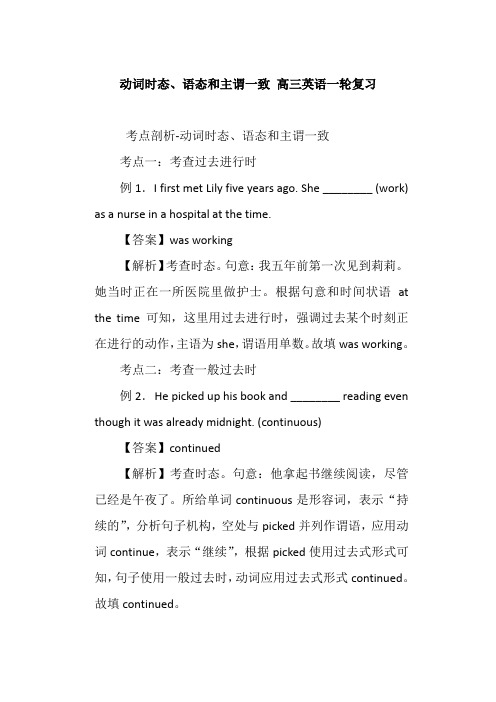
动词时态、语态和主谓一致高三英语一轮复习考点剖析-动词时态、语态和主谓一致考点一:考查过去进行时例1.I first met Lily five years ago. She ________ (work) as a nurse in a hospital at the time.【答案】was working【解析】考查时态。
句意:我五年前第一次见到莉莉。
她当时正在一所医院里做护士。
根据句意和时间状语at the time 可知,这里用过去进行时,强调过去某个时刻正在进行的动作,主语为she,谓语用单数。
故填was working。
考点二:考查一般过去时例2.He picked up his book and ________ reading even though it was already midnight. (continuous)【答案】continued【解析】考查时态。
句意:他拿起书继续阅读,尽管已经是午夜了。
所给单词continuous是形容词,表示“持续的”,分析句子机构,空处与picked并列作谓语,应用动词continue,表示“继续”,根据picked使用过去式形式可知,句子使用一般过去时,动词应用过去式形式continued。
故填continued。
考点三:考查现在进行时例3.—Hi, Jessy. Why are you going to work on foot today?—Well, my car ________. (repair)【答案】is being repaired【解析】考查时态和语态。
句意:——你好,杰西。
你今天为什么要步行去上班?——嗯,我的车正在修理。
根据句意提到步行上班可知,此处表示:车在修理中,时态用现在进行时,主语my car与repair(修理)之间为被动关系,所以用现在进行时的被动语态。
主语my car为单数,be动词用is。
考点四:考查现在完成时例4.The city ________ (recognize) as the musical capital of Europe since the 16th century, home to the likes of Mozart and Beethoven.【答案】has been recognized【解析】考查时态语态。
英语动词时态和语态
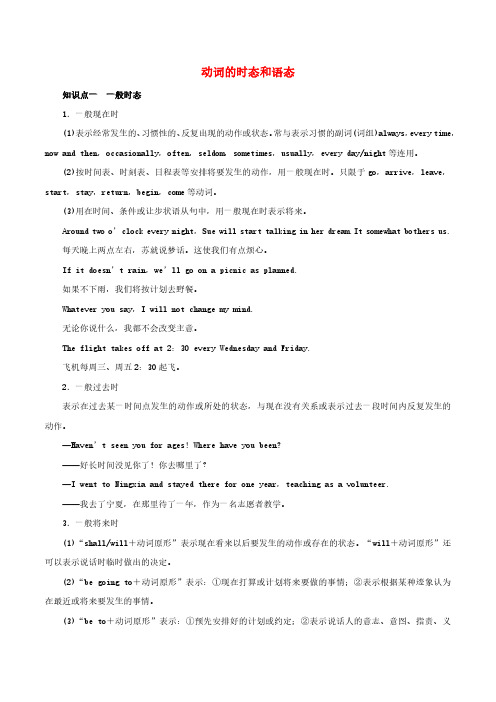
动词的时态和语态知识点一一般时态1.一般现在时(1)表示经常发生的、习惯性的、反复出现的动作或状态。
常与表示习惯的副词(词组)always,every time,now and then,occasionally,often,seldom,sometimes,usually,every day/night等连用。
(2)按时间表、时刻表、日程表等安排将要发生的动作,用一般现在时。
只限于go,arrive,leave,start,stay,return,begin,come等动词。
(3)用在时间、条件或让步状语从句中,用一般现在时表示将来。
Around two o’clock every night,Sue will start talking in her dream.It somewhat bothers us.每天晚上两点左右,苏就说梦话。
这使我们有点烦心。
If it doesn’t rain,we’ll go on a picnic as planned.如果不下雨,我们将按计划去野餐。
Whatever you say,I will not change my mind.无论你说什么,我都不会改变主意。
The flight takes off at2:30every Wednesday and Friday.飞机每周三、周五2:30起飞。
2.一般过去时表示在过去某一时间点发生的动作或所处的状态,与现在没有关系或表示过去一段时间内反复发生的动作。
—Haven’t seen you for ages!Where have you been?——好长时间没见你了!你去哪里了?—I went to Ningxia and stayed there for one year,teaching as a volunteer.——我去了宁夏,在那里待了一年,作为一名志愿者教学。
3.一般将来时(1)“shall/will+动词原形”表示现在看来以后要发生的动作或存在的状态。
2023年英语中考语法总复习—8.动词时态和语态
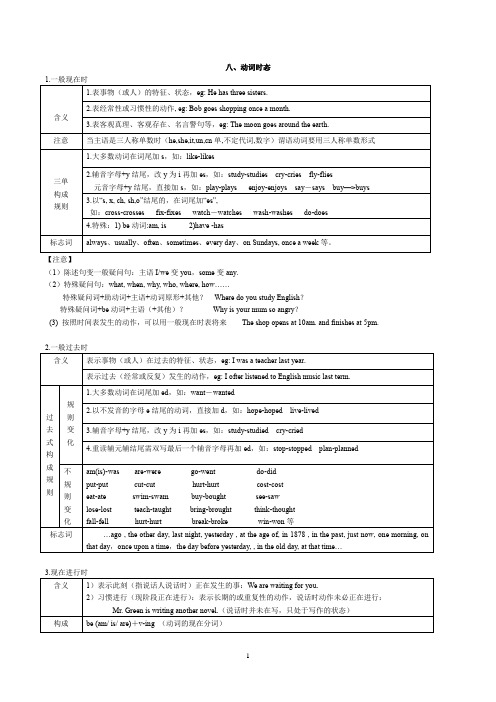
八、动词时态【注意】(1)陈述句变一般疑问句:主语I/we变you,some变any.(2)特殊疑问句:what, when, why, who, where, how……特殊疑问词+助动词+主语+动词原形+其他?Where do you study English?特殊疑问词+be动词+主语(+其他)?Why is your mum so angry?(3) 按照时间表发生的动作,可以用一般现在时表将来The shop opens at 10am. and finishes at 5pm.【注意】(1)always也可用于现在进行时,表示一种强烈的感情色彩,译为“总是”He is always telling lies.(2)某些特殊动词不能用于现在进行时。
① have当“有”讲时,不能用现在进行时。
I have two books now.②“belong to” The two people belong to me now.③表示“心理活动/状态/感觉”的词I want a dog now.① be going to主要用于:主观判断(1)表示事先经过考虑、安排好打算要做的事情:I’m going to play the violin.(2)表示根据目前某种迹象判断,某事非常有可能发生(有迹象表明要发生的事)。
Look!There come the dark clouds. It is going to rain.② will主要用于:(1)客观上将来势必发生的事情, 未经事先考虑, 临时决定的They will go to visit the factory tomorrow.(2)表示不以人的意志为转移的自然发展的未来的事:Today is Saturday. Tomorrow will be Sunday.(3)表意愿。
问对方是否愿意做某事或表示客气地邀请或命令:Will you please turn on the radio?(1) have/has been to “去过已回”She has been to Japan twice.have/has gone to. “去了未回”Where is your twin sister? She has gone to Japan.have/has been in “待在某地” She has been in Japan for 2 years. (2) 动词从词义上可以分为延续性和非延续性两种。
2023年中考英语复习动词时态、语态 课件

He joined the League three years ago. ( 三年前入团,joined为短暂行为。)
I have finished my homework now. ---Will somebody go and get Dr. White? ---He's already been sent for.
I'd rather you came tomorrow.
4) wish, wonder, think, hope 等用过去时,作试探性 的询问、请求、建议等。如:
I thought you might have some. 我以为你想要一些。
比较:
一般过去时表示的动作或状态都已成为过去,现已 不复存在。
He is used to a vegetarian diet. Scarf is used to taking a walk.(现在习惯于散步)
典型例题
---- Your phone number again? I _A__ quite catch it. ---- It's 69568442. A. didn't B. couldn't C. don't D. can't
3) be +不定式表将来,按计划或正式安排将发 生的事。如:
We are to discuss the report next Saturday. 4) be about to +不定式,意为马上做某事。如:
He is about to leave for Beijing. 注意:be about to 不能与tomorrow, next week 等表示明确将来时的时间状语连用。
高考英语复习谓语动词时态语态课件

时态体现在句子的谓语动词 语态:主动语态、被动语态 主动语态表示主语是动作的执行者。 They built a bridge over the river. 被动语态表示主语是动作的承受者。 A bridge was built over the river (by them).
number of areas that w__e_re_ (be) previously unprotected, bringing many of the existing protected areas for giant pandas under one authority to increase effectiveness and reduce inconsistencies in management.
3.(2022·新高考Ⅱ卷)Henry _w__as__fi_x_in_g___ (fix) his car when he heard the screams. 4.(2022·全国甲卷)In the last five years, Cao _h_a_s__w_a_lk_e_d__ (walk) through
12.in/over the last/past5 years在过去的5年时间里
表示在过去某一时刻或动作之前已经完成的动作,即 “过去的过去”;通常以一般过去时作参照。
past A B now
future
过去完成时 一般过去时 句中常含有:by/before+过去, by last year, by the end of 1998, by the time +过去
11.at the age of 5
专题13 动词时态语态(现在时)(课件)2024年高考英语一轮复习(全国通用)

【即时训练】
5. My physics teacher told me that light _t_r_a_v_e__ls___(travel) faster than
sound. 6. (2012全国)"Life is like walking in the snow", Granny used to say,
03
现在完成时
PART THREE
【要点精讲】 表示从过去某时开始的动作一直持续到现在并有可能继续下去。 常见标志词:副词型---already, ever, never, recently, lately, yet; 短语型---so far, every since, for days, up to now, in the past two years, over the weeks等。概括为:发生在过去,影响在现在。 例1:Since then, he has developed another bad habit. 例2:Up to now, everything has been OK. 例3:There has been no rain here for nearly two months.
"because every step _s_h_o__w_s__ (show).”
7. (2018全国I)While running regularly can’t make you live forever, the
review says it __is__ (be) more effective at lengthening life than walking,
【即时训练】 10. Look at the timetable. Hurry up! Flight 4026 __ta_k_e_s_(take)off at 18:20. 11. Ladies and gentlemen, please fasten your seat belts. The plane__is_t_a_k_in_g__ (take) off.
动词的时态和语态-2025年高考英语一轮复习参考答案

动词的时态和语态时态:时态主动被动一般现在时do/does; am/is/are am/is/are done一般过去时did; was/were was/were done 一般将来时will/shall do will/shall be done过去将来时would/should dowas/were going to dowas/were(about)to dowould/should be donewas/were going to be donewas/were(about)to be done现在进行时am/is/are doing am/is/are being done过去进行时was/were doing was/were be ing done将来进行时will/shall be doing现在完成时have/has done have/has been done过去完成时had done had been done将来完成时will have done will have been done2.必备知识考点一一般时知识点1一般现在时1.表示经常性的动作,常与usually,always,often,sometimes,never,every day等表示频度的时间状语连用。
2.表示客观真理、格言或者警句等。
3.表示按规定、时间表、计划或安排要发生的动作。
动词come, go, arrive, leave, start, begin, return, live, fly等,常用一般现在时表示将来发生的动作。
4.在时间、条件等状语从句中常用一般现在时代替一般将来时。
5.以here/there开头引导的倒装句,表示正在发生的动作/状态6.用于文章标题、图片说明、电影说明、戏剧内容及场景解说等。
知识点2一般过去时1. 表示在过去发生的一次性动作或习惯性动作或存在的状态,常用yesterday,last year,in 1995,the other day等作时间状语。
(人教版)中考英语总复习语法:专题8-动词的时态、语态(101页)

(2)过去完成时与现在完成时的主要区别是时间参 照点不同: 过去完成时的时间参照点是某个“过去的” 时间;现在完成时的时间参照点是“现在”。因此现在 完成时中的很多规则,也适用于过去完成时。 When I got to the cinema, the film had been on. 当我到达电影院时,电影已经开始了。
以辅音字母+y结尾的动词, 把y变为i再加-ed
以一个元音字母加一个辅音 字母结尾的重读闭音节词, 双写结尾字母再加-ed
study→studied carry→carried stop→stopped drop→dropped prefer→preferred
3.一般将来时 (1)表示将来某个时间要发生的动作或存在的状 态,其构成形式:“will/shall+动词原形”。常与表 示将来的时间状语tomorrow,next week,in+一段时 间等连用。 当主语是第一人称I或we时,问句中一般用shall。
③表单纯性的将来,与人的主观愿望和判断无关 时。 If it's made of wood, it will float on water. 这要是木材做的,它能浮在水面上。 (4)当主句为一般将来时态时,在if,as soon as, until, when等引导的状语从句中用一般现在时代替一 般将来时。 I will call you as soon as I get there. 我一到那儿就给你打电话。
特殊情况:have→has,am/are→is 考查热点:如果主句为一般将来时,if,unless等 引导的条件状语从句和when,until,as soon as等引导 的时间状语从句常用一般现在时表示将来。 What about going climbing if it doesn't rain tomorrow? 如果明天不下雨,去爬山怎么样?
专题10 动词的时态和语态(课件)-2024年中考英语复习(全国通用)

14.(2022·湖北武汉·统考中考真题)—I don’t think sixteen-year-olds should be allowed
to drive. —I ________. It’s not safe. A.agree B.agreed C.will agree
D.had agreed
apples in the fridge now.
A.is
B.are
C.was
D.were
【答案】A 【解析】句意:现在冰箱里有一些果汁和几个苹果。考查一般现在时及 “there be”。根据“now”,排除过去时态的CD,由于there be的就近原则, some juice不可数,所以应是is。故选A。
5.(2023·甘肃白银·校考一模)Thanks to those cleaners who ________ hard on the streets, we can have a beautiful city. A.work B.worked C.have worked D.were working
真理。
时态的辨析 满分秘籍
易失分点
提分特训
时态 谓语动词
意义
例句
一般
表示过去
过去 was/were,did 的动作或
时
状态。
When he was a child, he often swam in the river.当他小的时候,他经常在河里游泳。
16.(2023·江苏南通·统考一模)—What will the weather be like tomorrow? —I was on the phone and ________ most of the weather report. A.have missed B.was missing C.will miss D.missed
专题14 动词时态语态(过去时)(课件)2024年高考英语一轮复习(全国通用)

【要点精讲】 intend, mean, hope, want, plan, suppose, expect, think 等动词的过去完成时可以用来表示一个本来打算做而 未做的事。 They had wanted to help but couldn't get here in time. I had intended to call on you, but was prevented from doing so.
【要点精讲】 一般过去时表示过去的习惯性或经常发生的动作,常 与often,usually,seldom等频度副词连用。 例:When I was in the countryside, I often called on my old friends there.
【即时训练】
5. (2015湖南) I had a strong desire to reach in and play with the toy, but
【要点精讲】 always, forever, continually, constantly频度副词与过 去进行时连用表示赞扬,抱怨等感情色彩。 例1:The girl was always changing her mind. 例2:In the past he was constantly asking me for money.
【即时训练】
8. How I wish every familyh_a_d__ (have) a large house with a beautiful
garden! 9. When a pencil is partly in a glass of water, it look as if it
Irene d_e__c_la__r_ed(declare) she had no plans to retire from her 36-year-old
专题01 动词的时态及语态(原卷版)(全国通用版)-高考英语复习

专题01 动词的时态及语态时态知识梳理重点用法1 一般现在时用法:1.be(am,is,are)动词的使用由主语的人称和数决定。
行为动词的第三人称单数加-s/es,其余人称用动词原形。
I am free tonight.我今晚有空。
The boy is ten years old.这个男孩10岁了。
They are students.他们是学生。
Bill often helps others.We like him a lot.比尔总是帮助他人。
我们很喜欢他。
2.表示经常、习惯性发生的动作或存在的状态。
It often rains in our city.我们的城市经常下雨。
3.表示普遍真理和客观真实。
The earth moves round the sun.地球围绕太阳转。
4.表示心理状态或情感的动词往往用一般现在时。
She hates rock music.她讨厌摇滚乐。
5.在时间、条件状语从句中表示将来的动作。
I will call on you as soon as I am free.我空闲时会去拜访你。
提示:一般现在时可以用来代替一般将来时,表示已经预先计划或安排的肯定将要发生的动作,句中常有表示将来时间的状语。
这一用法主要用于下列动词,如果arrive(到达),be (是),begin(开始),come(来到),go(去),leave(离开),reach(到达),start(出发)等。
The train leaves at eight o’clock.火车8点钟开车。
注意:一般现在时常用的时间状语有:today今天often经常always一直sometimes有时usually通常seldom很少on Sunday在星期天every day/week/morning每天/每周/每天早上重点用法2 一般过去时用法:1.be(was/were)动词的使用由主语的人称和数决定。
行为动词都要用过去式。
英语高考复习——语态、时态、情态动词

英语高考复习——语态、时态、情态动词1. 语态是动词的一种形式,它表示主语和谓语的关系。
语态有两种:主动语态和被动语态。
如果主语是动作的执行者,或者是说动作是由主语完成的,要用主动语态;如果主语是动作的承受者,或者是说动作不是由主语而是由其他人完成的,则用被动语态。
2.被动语态基本结构:be+P.P.(过去分词)3.各时态构成清单1).一般现在时is\am\are+P.P(过去分词)2.)一般过去时was\were+P.P3.)一般将来时will be+P.P4.)现在进行时is\am\are+being(固定不变)+P.P5.)过去进行时was\were+being(固定不变)+P.P6.)现在完成时have\has been+P.P7.)过去完成时had been+P.P4..被动语态的构成方法:主动语态变被动语态时,主动语态句中的宾语变成被动语态句中的主语,主动语态句中的主语成为被动语态句中的动作的发出者。
被动语态的口诀:一般现、过去时态用be +V.过去分词,be有人称、时、数变。
完成时态have(has) done,被动将been加中间。
一般将来shall (will) do,被动变do为be done。
将来进行无被动,shall (will) be doing,现在完成进行同,have (has) been doing。
现、过进行be doing, 被动be加being done。
情、助、有、是妥安排,一律随新主语变。
否定助后加not,疑问一助置主前。
主语恰是疑问词,直陈语序主在前。
一般情助加be done,双宾多将间宾变。
复合宾语宾变主,宾补、主补相应变。
对口决的解释: "be有人称、时、数变"即be有人称、时态和单、复数的变化。
"情助"是指情态动词和助动词must,may,can,shall,will等一律随新主语(多是主动句中的宾语)来变化。
!!!复习八:动词时态和语态
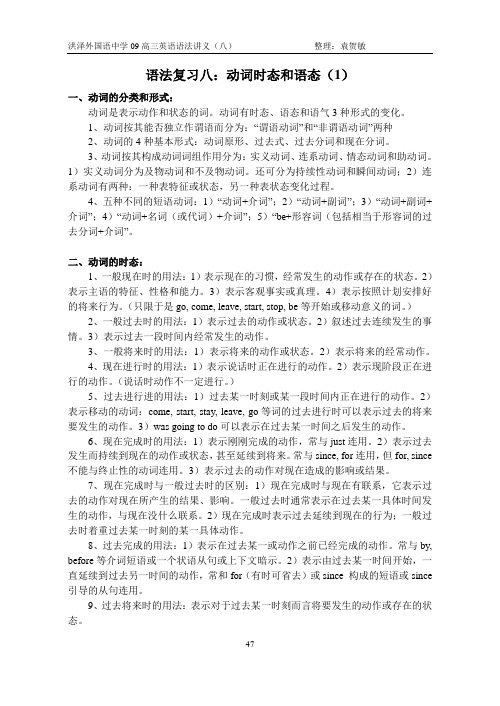
语法复习八:动词时态和语态(1)一、动词的分类和形式:动词是表示动作和状态的词。
动词有时态、语态和语气3种形式的变化。
1、动词按其能否独立作谓语而分为:“谓语动词”和“非谓语动词”两种2、动词的4种基本形式:动词原形、过去式、过去分词和现在分词。
3、动词按其构成动词词组作用分为:实义动词、连系动词、情态动词和助动词。
1)实义动词分为及物动词和不及物动词。
还可分为持续性动词和瞬间动词;2)连系动词有两种:一种表特征或状态,另一种表状态变化过程。
4、五种不同的短语动词:1)“动词+介词”;2)“动词+副词”;3)“动词+副词+介词”;4)“动词+名词(或代词)+介词”;5)“be+形容词(包括相当于形容词的过去分词+介词”。
二、动词的时态:1、一般现在时的用法:1)表示现在的习惯,经常发生的动作或存在的状态。
2)表示主语的特征、性格和能力。
3)表示客观事实或真理。
4)表示按照计划安排好的将来行为。
(只限于是go, come, leave, start, stop, be等开始或移动意义的词。
)2、一般过去时的用法:1)表示过去的动作或状态。
2)叙述过去连续发生的事情。
3)表示过去一段时间内经常发生的动作。
3、一般将来时的用法:1)表示将来的动作或状态。
2)表示将来的经常动作。
4、现在进行时的用法:1)表示说话时正在进行的动作。
2)表示现阶段正在进行的动作。
(说话时动作不一定进行。
)5、过去进行进的用法:1)过去某一时刻或某一段时间内正在进行的动作。
2)表示移动的动词:come, start, stay, leave, go等词的过去进行时可以表示过去的将来要发生的动作。
3)was going to do可以表示在过去某一时间之后发生的动作。
6、现在完成时的用法:1)表示刚刚完成的动作,常与just连用。
2)表示过去发生而持续到现在的动作或状态,甚至延续到将来。
常与since, for连用,但for, since 不能与终止性的动词连用。
高考英语动词时态语态复习课件

be going to 有很强的计划性;打算干什么;而will表示谈 话时临时决定的意图;具有临时性和偶然性
① The telephone is ringing I _____ answer it
√A. will B am going to C am to D am about to
② Alice; why didn’t you come yesterday
3 用一般过去时表示过去经常发生的动作 也可用 used to do或 would do 代替 During the vacation I often swam /
would swim / used to swim in the sea 假期期间我常在大海里游泳
I used ur daily life as a high school student
using 3 sentences or more;使用实意动词 和系动词; 注意动词形式变化
一 一般现在时 The Simple Present tense
1 结构: do/does
2 用法: 1 经常性或习惯性的动作;常与表示频率 的时间状语连用;如often; usually; always; every day/year; sometimes; on Sunday等
My family have lived in Zhuhai for 10 years 目前还在珠海
2 过去时常与具体的表示过去的时间状语连用;而 现在完成时通常与不确定的或包括现在在内的时 间状语连用;或无时间状语
I study hard every day and I get along well with my classmates; but sometimes I miss my families
人教版初三英语动词的时态和语态复习
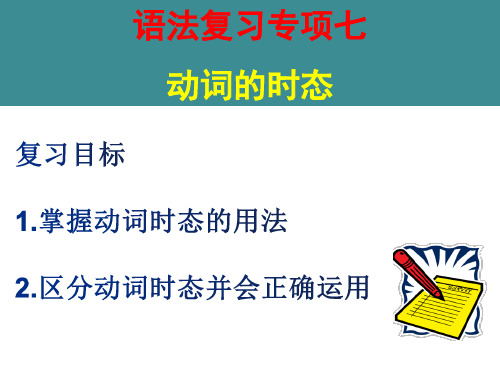
【中考链接】
( ) 1. —I heard your father had gone to Beijing on business.
—Yes. And he ____A___ in three weeks. A. will return B. has returned C. returned D. returns ( ) 2. Just go down this road and you __D_____
等,也常和
等引导的状语从句连用.
★必背句式 It is/has been+一段时间+since+一般过去时
It is/has been five years since he lived in China.
【中考链接】
( ) 1. —Are you going anywhere?
—I __D____ about visiting my sister, but I have changed my mind.
the library next to the bank. A. see B. saw C. have seen D. will see
( ) 3. We ____B___ have a picnic together with our teachers next Thursday.
A. are going B. are going to C. will going D. may going to
B. watches
C.was watching D.watching
3.-----Hey ,what did I say? -----I _________. A. I’m not listening B. I was not listening
中考英语总复习 专题10 动词的时态和语态课件

归纳现在进行时的构成
主语+am/is/are+动词-ing形式
现在进行时的用法
1.表示(biǎoshì)现在(指说话人说话时)正在发生的事情。如: We are waiting for you. 我们正在等你。 2.表示当前一段时间内的活动或现阶段正在进行的动作。如: Mr.Green is writing another novel these days.
A.takes B.took
C.will take D.has taken
第五页,共二十三页。
归纳一般过去时的构成
主语+was/were/did+其他 一般过去时的用法 (1)表示过去某个时间或某一段时间内发生的动作或存在(cúnzài)的状 态。常见的时间状语有:yesterday,last week,an hour ago,the other day,in 1982等。如: Where did you go just now?
您还要些什么吗?
I wondered if you could help me. 我在想你能不能帮我一下。
②情态动词 could,would。如:
Could you lend me your bike? 你的自行车能借我用一下吗?
第七页,共二十三页。
(三)现在(xiànzài)进行时
第八页,共二十三页。
(一)常考的被动语态
A.Invites
C.was invited
B.is invited
D.has invited
第十八页,共二十三页。
2.(2017—2018学年(xuénián)安徽合肥蜀山50中西区第三次月考)If more salt
C to the soup,it will taste better. A.will add B.adds C.is added D.will be added 3.(2018·安徽合肥庐阳区二模,44)All the people I have known in the past three
英语动词时态和语态知识点总结

英语动词时态和语态知识点总结
英语动词时态和语态是学习英语中非常重要的部分,以下是关于这两部分的知识点总结:
动词时态:
1. 现在简单时(Simple Present Tense):表示现在的习惯或经常发生的动作。
2. 过去简单时(Simple Past Tense):表示过去发生的动作。
3. 现在进行时(Present Continuous Tense):表示正在进行的动作或当前的状态。
4. 过去进行时(Past Continuous Tense):表示过去某个时间正在进行的动作。
5. 现在完成时(Present Perfect Tense):表示已经完成的动作,并对现在有影响。
6. 过去完成时(Past Perfect Tense):表示在过去某个时间之前已经完成的动作。
7. 将来简单时(Simple Future Tense):表示将来的动作。
8. 将来进行时(Future Continuous Tense):表示将来正在进行的动作。
9. 将来完成时(Future Perfect Tense):表示将来某个时间之前已经完成的动作。
动词语态:
1. 主动语态(Active Voice):主语执行谓语的动作。
2. 被动语态(Passive Voice):主语接受谓语的动作。
通过理解并掌握这些基本概念,可以帮助更好地理解和使用英语动词,提高英语表达能力。
- 1、下载文档前请自行甄别文档内容的完整性,平台不提供额外的编辑、内容补充、找答案等附加服务。
- 2、"仅部分预览"的文档,不可在线预览部分如存在完整性等问题,可反馈申请退款(可完整预览的文档不适用该条件!)。
- 3、如文档侵犯您的权益,请联系客服反馈,我们会尽快为您处理(人工客服工作时间:9:00-18:30)。
Exercises
1. I usually _g_e_t_ up at 6:00, but yesterday I __g_o_t__ up at 7:00 and tomorrow I _w__il_l__g_e_t_
七.过去完成时 (The past perfect Tense)
1. 结构: had + 过去分词 2. 概念:表示过去的过去
----|--------------|---------|----> 过去之前 过去 现在 将来
When the police arrived, the thieves _h_a_d__r_u_n__a_w__a_y____(run away).
1.结构: 主语为第三人称单数,谓动要变化,其
余人称用原形.
2. 用法: 1) 经常性或习惯性的动作,常与表示频率的时
间状语连用,如often/ usually, every…, sometimes, at…, on Sunday。
2)表示不受时间限制的科学事实或客观真理。 The earth moves around the sun.
一般现在时 ( The Simple Present tense 一般过去时 ( The Simple Past Tense ) 现在进行时(The Present Continuous Tense)
过去进行时(The Past Continuous Tense)
现在完成时(The Present Perfect Tense) 过去完成时 (The Past Perfect Tense) 一般将来时( The Simple Future Tense ) 过去将来时(The Simple Past Future Tense)
与表示延续性的时间状语连用,如:so far, up to now, recently, in the past 6 years, since…, for … 等等. I have lived in Zhuhai for 3 years.
2).表示发生在过去的某一动作对现在造成的影响 或结果,常用的时间状语有: just ,already, yet, ever, never, once等等.
• since +时间点, 用来说明动作起始时间 • for+ 时间段, 用来说明动作延续时间长度。
I have lived here for more than twenty years. I have lived here since I was born..
You graduated (毕业) from Junior Middle School in July 2009. You had stayed there for 3 years when you graduated.
一.一般过去时 ( The Simple Past Tense )
1.结构: 谓动用动词过去式
2.用法: 在过去时间里所发生的动作或存在的 状态。常与表示过去时间的时间状语连用。 如 yesterday, last week, an hour ago, in 1982等。
How is your daily life as a high school student?
internet?
5. He fell asleep while he w__a_s_r_e_a_d__in__g (read) a
book.
6. I ___h_a_v_e__ never __h_e_a_r_d_ (hear) of that man
before.
7. My brother often ___w__e_n_t__ (go) for walks
(3 sentences or more,使用实意动词和系动词, 注意动词形式变化)
I study hard every day and I get along well with my classmates, but sometimes I miss my families.
二. 一般现在时 ( The Present Indefinite )
How did you spend your childhood?
(3 sentences or more,使用实意动 词和系动词, 注意动词形式变化)
Example:
I __s_p_e_n_t_ (spend) my childhood happily with my old friends. We always _p_l_a_y_e_d__(play) football and basketball together and we _d_i_d_n_’_t_ (not) have so much homework to do as now. We ___w_e__re_ (be) happy at that time.
作或状态。常用的时间状语 at ten yesterday, from nine to ten last evening, when…, while…
English, boring or funny?
Q1: How old were you when you first started learning English?
注意:
非延续性动词的否定形式可以与表示延续时间 的状语连用。即动作不发生的状态是可以持续 的。
I have received his letter for a month. (错) I haven't received his letter for almost a month. (对)
比较since和for
犹如
How will you spend your Spring Festival holiday? I will… I’m going to…
三. 一般将来时( The Simple Future Tense )
1. will / be going to do 2. be +to do,按计划或正式安排将发生的事。 We are to have an exam this week. 3. be about to do, 表示马上做某事, 不能与明确 表示将来的时间状语连用.
3) 表示已安排或计划好将来必定会发生的动作 或存在的状态, 一般用于be, come, go, start, begin, leave, arrive, return等动词中,常与时 间状语连用.如:
The meeting starts at 2:00 p.m.
Dad said to me, “I will buy a computer for you if you can pass the exam.”
last summer.
8. Lily said she __w_o_u__ld_ (put) on the new dress
the next day.
He is about to leave for Beijing.
What are they doing now? They are haviesent Continuous Tense
1.结构: be (am, are, is)+ doing 2. 用法:
Dad told me (that) hew__o_u_l_d_b__u_y (buy) a
computer for me if I could pass the exam.
.过去将来时(The past future simple Tense)
1. 用法: 过去将来时表示立足于过去某一时间看 将要发生的动作或存在的状态, 常用于宾语从句 中. 2.结构: 1)Should / would+动词原形
The boy promised he would work hard. I told my parents I should return early.
2).其他形式. was (were) going to was (were) to was (were) about to
+动词原形
• picture
We have finished our lunch already. Have you ever tried this method?
比较一般过去时与现在完成时
1). 一般过去时只表示发生在过去的动作或存 在的状态, 不涉及对现在的影响;现在完成 时表示发生在过去的动作或状态一直延续到 现在,或强调过去的事情对现在的造成的影响。
My family lived in Zhuhai ten years ago. (现在不在了)
My family have lived in Zhuhai for 10 years. (目前还在珠海)
2). 过去时常与具体的表示过去的时间状语连用, 而现在完成时通常与不确定的或包括现在在内 的时间状语连用,或无时间状语.
I studied in Zhongshan university in 2000.
(2000年表示具体的过去时间)
I have studied in Zhongshan university since 2000. (since 2000表示从2000年至今,包 括现在在内)
I have just bought an apartment. (just表示不 确定的时间状语)
1) 表示现在( 指说话时)正在发生的事情。 We are having English class now.
2) 表示目前这段时间内正在进行的动作,但说 话时动作未必正在进行。
